The successor to the ThinkPad T490s is here, packing 10th Gen Intel or AMD Ryzen 4000 mobile processors.
The collection of Lenovo's business laptops is ever-growing and evolving, and with 2020 comes a rebrand of the ThinkPad T490s to the ThinkPad T14s. It's still a slim version of the standard T14 (it's the "s" in the name), and it's available with both AMD and Intel processor (CPU) options with a few key differences other than performance. I've been using both for about a week, comparing as I go to see which one is the better deal and, ultimately, which one is more deserving of your money.
AMD And Intel Hardware
Lenovo ThinkPad T14s
Bottom line: The ThinkPad T14s is a well-built, slim business laptop that focuses on comfortable productivity, battery life, and security. For best performance (and generally a more affordable price), opt for AMD's Ryzen PRO 4000 mobile CPUs.
Pros
- Long battery life
- Overall strong performance
- Generous port selection
- Optional LTE connectivity
- Great keyboard, sizable touchpad
Cons
- Disappointing display color
- Chunky bezels
- AMD battery life not on par with Intel
- Prices climb quickly
Jump to:
- At a glance
- Design and features
- Keyboard and touchpad
- Display
- Performance and battery
- Should you buy?
Lenovo ThinkPad T14s at a glance
Lenovo supplied Windows Central with two review units of the ThinkPad T14s, one with an Intel Core i5-10310U vPro CPU and one with an AMD Ryzen 7 PRO 4750U. Both models include 16GB of DDR4 dual-channel RAM (soldered), a 512GB M.2 PCIe solid-state drive (SSD), and a 14-inch 1080p touch display.
The exact AMD configuration costs about $1,833 at Lenovo, while the exact Intel version costs about $2,834 at Lenovo. For a better deal on the Intel model -- albeit with non-vPro Core i5-10210U CPU and the low-power FHD display option -- you can get 16GB of RAM and a 512GB SSD for about $1,855 at Newegg. Likewise, a better deal on the Ryzen model with 16GB of RAM and 512GB SSD is about $1,521 at Newegg. It's clear that the AMD version is going to cost less than the Intel version in most cases.
Here's a look at the exact specs in both review units of the ThinkPad T14s I received from Lenovo.
| Category | ThinkPad T14s (AMD) | ThinkPad T14s (Intel) |
|---|---|---|
| OS | Windows 10 Pro | Windows 10 Pro |
| Processor | AMD 4000 Ryzen 7 PRO 4750U Eight cores Sixteen threads Up to 4.1GHz 15W TDP |
10th Gen Intel Core i5-10310U vPro Four cores Eight threads Up to 4.40GHz 15W TDP |
| RAM | 16GB DDR4-3200MHz Dual-channel Soldered |
16GB DDR4-3200MHz Dual-channel Soldered |
| Graphics | Integrated Radeon Vega 7 |
Integrated Intel UHD Graphics |
| Storage | 512GB M.2 PCIe SSD Western Digital SN730 |
512GB M.2 PCIe SSD Samsung PM981a |
| Display | 14 inches 1920x1080 (FHD) 16:9 aspect ratio Anti-glare Touch |
14 inches 1920x1080 (FHD) 16:9 aspect ratio Anti-glare Touch |
| Ports | Two USB-A 3.2 (Gen 1) Two USB-C 3.2 (Gen 2) HDMI 2.0 microSD card reader Network extension adapter 3.5mm audio Smart Card reader (optional) |
Two USB-A 3.2 (Gen 1) Thunderbolt 3 USB-C 3.2 (Gen 1) HDMI 1.4 microSD card reader Network extension adapter 3.5mm audio Smart Card reader (optional) |
| Audio | Dual 1W speakers Dolby Audio |
Dual 1W speakers Dolby Audio |
| Wireless | Intel Wi-Fi 6 AX200 802.11ax (2 x 2) Bluetooth 5.1 |
Intel Wi-Fi 6 AX201 802.11ax (2 x 2) Bluetooth 5.0 |
| Camera | Front-facing 720p IR camera |
Front-facing 720p |
| Security | Webcam shutter FIDO authentication dTPM 2.0 Fingerprint reader AMD Memory Guard PrivacyGuard (Optional) Kensington lock slot |
Webcam shutter FIDO authentication dTPM 2.0 Fingerprint reader PrivacyGuard (Optional) Kensington lock slot |
| Battery | 57Wh 65W AC adapter |
57Wh 65W AC adapter |
| Dimensions | 12.94 x 8.90 x 0.66 inches (328.8mm x 226.15mm x 16.7mm) |
12.94 x 8.90 x 0.66 inches (328.8mm x 226.15mm x 16.7mm) |
| Weight | From 2.8 pounds (1.27kg) | From 2.8 pounds (1.27kg) |
| Color | Black | Silver Black |
Same chassis, different ports
Lenovo ThinkPad T14s design and features
Compared to the 2019 ThinkPad T490s that we also reviewed, the rebranded T14s has almost the exact same dimensions and weight. This is a slim, compact 14-inch Ultrabook that won't take up much space in a backpack or briefcase. Both laptops have been put through stringent tests to ensure durability and are built from aluminum and carbon fiber polymer. The AMD version is available only in the classic ThinkPad Black finish, whereas you can grab the Intel version with a Silver finish and full aluminum build. The laptops are thin, but they are rigid.
The ThinkPad T14s is a slim workhorse that doesn't skimp on durability.
Ports are nearly the same on both models, and in general, the connectivity is generous. On the left side of the Intel model is USB-C 3.2 (doubling as a charging port), Thunderbolt 3, Ethernet extension adapter, USB-A 3.2, HDMI 1.4, and a 3.5mm audio jack. On the right is a single USB-A 3.2 and a Kensington lock slot. The AMD model has the same layout, though it lacks Thunderbolt 3; it instead has two USB-C 3.2. This might be an issue if you're looking to connect something like an external GPU with Thunderbolt 3. Still, otherwise, there are plenty of powerful docking stations that use USB-C. Note that the AMD model's HDMI port is 2.0 instead of 1.4.
On the rear edge of both laptops are a combination microSD card reader and SIM slot if you choose to add an LTE card. An optional Smart Card reader can be added to either laptop if required.
Wireless connectivity other than the optional 4G LTE includes Intel Wi-Fi 6 in both models for fast, reliable wireless internet. The AMD model has Bluetooth 5.0, while the Intel version has Bluetooth 5.1. In either case, you won't be starving for a quality connection, especially if you invest in one of our picks for best Wi-Fi 6 router.
ThinkPads are heavily associated with security, and both laptops are stacked with included and optional features. A webcam shutter is included whether or not you select an IR camera at checkout for facial recognition. In this review case, the AMD version has IR, while the Intel version does not. It works without flaw, and it's backed up by a fingerprint reader embedded into the right palm rest. The Intel model has the same fingerprint reader, and both work without issue for fast, quick logins without a password.
The dual 1W down-firing speakers get plenty loud and are above average in terms of sound quality. The laptop is thin and light, yet there's decent bass and hardly any distortion at high volume. Dolby Audio, no doubt, helps with this. As for the camera, the IR and 720p combination in the AMD model seems to offer a better picture though neither is particularly astounding.
Plenty comfortable
Lenovo ThinkPad T14s keyboard and touchpad
If you're having a hard time choosing between Intel and AMD, it's not going to come down to the keyboard. Both laptops have the same layout -- with Fn and Ctrl keys swapped -- with deep travel and cupped keys. If you're upgrading an old ThinkPad, you'll feel right at home, and newcomers to the line should quickly fall into the easy typing feel.
The TrackPoint system is here for those who like using the red pointing nub and physical buttons. It's backed up by a sizable Precision touchpad with a mylar finish. Pointing is smooth and precise, allowing you to go about your work without any impediment.
Lots of options
Lenovo ThinkPad T14s display
Lenovo has a wide array of 14-inch WVA display options available for the ThinkPad T14s. AMD and Intel versions have a 250-nit FHD non-touch option, 300-nit FHD touch option (which both review units are using), 400-nit low-power FHD option, and 500-nit FHD touch option with Privacy Guard screen filter. These all have an anti-glare layer that does a good job of reducing the effects of working in a well-lit environment. If you'd like to step things up to 4K, only the Intel model has the option. It's still a WVA panel but includes Dolby Vision HDR 400, 500 nits brightness, and a glossy finish.
Testing color accuracy with a Datacolor SpyderX Pro, the AMD model's display hit just 62% sRGB, 46% AdobeRGB, and 46% DCI-P3, with up to 337 nits brightness. The Intel model's display didn't fare much better, managing 65% sRGB, 49% AdobeRGB, and 48% DCI-P3, with up to 342 nits brightness.
The picture still looks good thanks to the contrast and brightness, but those looking to include photo editing or who just like a color-accurate picture will likely be disappointed. The low-power and Privacy Guard options appear to have better color based on Lenovo's documentation, but the best option is no doubt the 4K display. Shame it's not available with the AMD hardware. And, of course, if you're looking to get the most battery life from your device, the low-power display should be the top choice.
AMD beats Intel
Lenovo ThinkPad T14s performance and battery
AMD has been on a tear with its Ryzen 4000 mobile CPUs, and the ThinkPad T14s is one of the first laptops to take advantage of the PRO variant. It comes with extra security and management features compared to the standard Ryzen 7 4000 mobile chips, plus its multithreading abilities lend it extra performance. If you're selecting one of these laptops and don't absolutely need Intel's vPro chips, it's going to make a better choice. Especially because of the price difference.
Lenovo's Vantage app has a bevy of extra features you can tweak to your liking, including a battery threshold toggle (to keep your battery from overcharging), smart standy be keep battery topped up when the laptop is idle, and an always-on USB toggle. If we're ever all flying regularly again, there's likewise an AC power limiter for times when you need to plug in while airborne.
Let's take a look at some raw benchmarks to see how the two ThinkPad T14s laptops compare to each other and to a bunch of other laptops we've recently reviewed.
Geekbench 5
Geekbench 5.0 (CPU) (Higher is better)
| Device | CPU | Single core | Multi core |
|---|---|---|---|
| Lenovo ThinkPad T14s (AMD) | Ryzen 7 4750U | 1,135 | 5,782 |
| Lenovo ThinkPad T14s (Intel) | i5-10310U | 1,143 | 3,734 |
| Acer Swift 3 (Intel) | i7-1065G7 | 1,302 | 3,891 |
| Acer Swift 3 (AMD) | Ryzen 7 4700U | 1,131 | 4,860 |
| Acer Spin 3 (SP314-54N) | i5-1035G1 | 1,185 | 3,524 |
| HP ENVY x360 | Ryzen 5 4500U | 1,100 | 4,564 |
| Lenovo IdeaPad Flex 5 14 | Ryzen 5 4500U | 1,087 | 4,570 |
| Surface Laptop 3 15 | Ryzen 5 3580U | 769 | 2,720 |
| Lenovo ThinkPad L13 Yoga | i5-10210U | 1,069 | 3,754 |
| Lenovo Yoga C640 | i3-10110U | 1,015 | 2,111 |
| Lenovo Yoga C740 14 | i5-10210U | 1,094 | 3,767 |
| Samsung Galaxy Book Flex | i7-1065G7 | 1,317 | 4,780 |
| Dell XPS 13 (9300) | i7-1065G7 | 1,284 | 4,848 |
| Surface Laptop 3 15 | i7-1065G7 | 1,336 | 4,893 |
| HP Elite Dragonfly | i7-8665U | 1,125 | 2,942 |
| Surface Laptop 3 13.5 | i5-1035G7 | 1,177 | 4,413 |
| HP Spectre x360 13 | i7-1065G7 | 1,006 | 3,402 |
| Surface Pro X | SQ1 | 725 | 2,819 |
| Galaxy Book S | SD 8cx | 685 | 2,681 |
I would have preferred measuring a Core i7 CPU against the Ryzen 7, but I feel the AMD chip would have still won out in overall performance. With eight cores and 16 threads, it is a powerhouse. Core i7 options still have just four cores and eight threads.
The Core i5 still wins in a single-core faceoff, but double the cores from AMD has it pull far ahead with the multi-core score. The Ryzen's Vega 7 integrated GPU scored 12,030 in the OpenCL test, while the Core i5's UHD Graphics hit 5,368. If you're looking for a laptop that can handle a bit of light gaming and photo editing, the Ryzen chips will be better suited.
PCMark
PCMark 10
| Device | Score |
|---|---|
| Lenovo ThinkPad T14s (AMD) | 4,659 |
| Lenovo ThinkPad T14s (Intel) | 4,214 |
| Acer Swift 3 (Intel) | 4,135 |
| Acer Swift 3 (AMD) | 4,861 |
| Acer Spin 3 (SP314-54N) | 3,674 |
| HP ENVY x360 | 4,755 |
| Lenovo IdeaPad Flex 5 14 | 4,759 |
| Surface Laptop 3 15 (AMD) | 4,006 |
| Lenovo IdeaPad Flex 14 | 3,202 |
| Surface Book 3 15 | 4,393 |
| Lenovo ThinkPad L13 Yoga | 4,899 |
| Lenovo Yoga C640 | 4,008 |
| Lenovo Yoga C740 | 4,941 |
| Samsung Galaxy Book Flex | 3,924 |
| Dell XPS 13 (9300) | 4,524 |
| Surface Laptop 3 15 (Intel) | 4,604 |
| Dell XPS 13 2-in-1 | 4,554 |
| HP Spectre x360 13 | 4,261 |
| HP Elite Dragonfly | 3,716 |
| LG gram 17 | 4,157 |
| Surface Pro 7 (i5) | 3,992 |
Strong performance from the Core i5 here all things considered. Both laptops had no issues handling a standard daily workload of word processing, heavy web browsing, photo editing, email, and instant messaging.
Cinebench
Cinebench (R20) (Higher is better)
| Device | CPU | Range |
|---|---|---|
| Lenovo ThinkPad T14s | Ryzen 7 4750U | 3,064 to 3,070 |
| Lenovo ThinkPad T14s | Core i5-10310U | 1,273 to 1,402 |
| Acer Swift 3 (Intel) | Core i7-1065G7 | 1,229 to 1,236 |
| Acer Swift 3 (AMD) | Ryzen 7 4700U | 2,391 to 2,428 |
| Acer Spin 3 (SP314-54N) | Core i5-1035G1 | 1,329 to 1,479 |
| HP ENVY x360 | Ryzen 5 4500U | 2,053 to 2,100 |
| Lenovo IdeaPad Flex 5 14 | Ryzen 5 4500U | 2,388 to 2,397 |
| Lenovo ThinkPad L13 Yoga | Core i5-10210U | 1,137 to 1,442 |
| Lenovo Yoga C640 | Core i3-10110U | 924 to 929 |
| Lenovo Yoga C740 15 | Core i7-10510U | 1,415 to 1,613 |
| Lenovo Yoga C740 14 | Core i5-10210U | 1,450 to 1,535 |
| LG gram 17 | Core i7-1065G7 | 1,079 to 1,199 |
| Acer Swift 5 (SF514-54T) | Core i7-1065G7 | 1,361 to 1,400 |
| Lenovo ThinkPad P53 | Xeon E-2276M | 2,686 to 2,701 |
| Surface Laptop 3 13.5 | Core i5-1035G4 | 1,584 to 1,606 |
| Surface Laptop 3 15 | Core i7-1065G7 | 1,703 to 1,745 |
Running Cinebench R20 repeatedly generally points out thermal issues the CPU might experience. In this case, the AMD Ryzen 7 had no problems performing well under load, more than doubling Intel's UHD Graphics. The Core i5 saw a larger dip in performance and just doesn't keep up in terms of raw power.
SSD
CrystalDiskMark (Higher is better)
| Device | Read | Write |
|---|---|---|
| Lenovo ThinkPad T14s (AMD) | 2,885.92 MB/s | 2,717.17 MB/s |
| Lenovo ThinkPad T14s (Intel) | 3,527.77 MB/s | 2,982.44 MB/s |
| Acer Swift 3 (Intel) | 1,641.39 MB/s | 1,033.82 MB/s |
| Acer Swift 3 (AMD) | 2,161.99 MB/s | 1,214.84 MB/s |
| Acer Spin 3 (SP314-54N) | 1,630 MB/s | 885 MB/s |
| HP ENVY x360 | 1,530 MB/s | 864 MB/s |
| Lenovo IdeaPad Flex 5 14 | 2,199.10 MB/s | 1,017.07 MB/s |
| Lenovo IdeaPad Flex 14 | 3,405 MB/s | 1,512 MB/s |
| Lenovo ThinkPad L13 Yoga | 3,188.82 MB/s | 1,685.61 MB/s |
| Lenovo Yoga C640 | 1,906.78 MB/s | 970.69 MB/s |
| Samsung Galaxy Book Flex | 3,376 MB/s | 2,983 MB/s |
| Dell XPS 13 (9300) | 3,000 MB/s | 1,217 MB/s |
| HP Spectre x360 (Optane) | 2,092 MB/s | 515 MB/s |
| Dell XPS 13 2-in-1 | 2,400 MB/s | 1,228 MB/s |
| HP Elite Dragonfly (Optane) | 2,124 MB/s | 548 MB/s |
| Lenovo Yoga C740 | 3,408 MB/s | 2,982 MB/s |
| LG gram 17 (2020) | 3,477 MB/s | 2,900 MB/s |
| Surface Laptop 3 15 | 2,028 MB/s | 806 MB/s |
| Surface Laptop 3 13.5 | 2,338 MB/s | 1,583 MB/s |
| Acer Swift 5 (SF514-54T) | 1,641 MB/s | 1,025 MB/s |
| Lenovo ThinkPad X1 Extreme (Gen 2) | 3,416 MB/s | 3,016 MB/s |
It's no doubt a bit of a toss-up depending on hardware availability, but both laptops have strong SSD performance. The Samsung PM981a in the Intel model is faster than the WD SN730 in the AMD model. SSDs are upgradeable in both models.
Enjoy all-day battery life from the ThinkPad T14s.
Battery life from the 57Wh battery is excellent in both versions of the laptop. The Intel Core i5 model with half as many cores lasted 11 hours and three minutes in PCMark 10's Modern Office rundown with brightness at about 60% and power set to "Better Performance." Real-world usage throughout the day still saw the laptop go for about nine or 10 hours, more than enough to get through a workday without having to plug in.
The Ryzen 7 model, with far more raw performance, lasted 10 hours and 43 minutes in the same test with similar screen brightness and power setting. Again, real-world usage saw that drop to just more than nine hours, but that's still an excellent result. Both laptops have Rapid Charge that delivers about 80% battery life in about an hour.
Shoot for AMD
Should you buy the ThinkPad T14s?
Who it's for
- Those who need a slim 14-inch business laptop
- Those who want a great typing experience
- Those who need plenty of ports and optional 4G LTE connectivity
- Those who want to spend more than $1,000
- Those who want a full workday of battery life
Who it isn't for
- Those who need dedicated graphics performance
- Those who don't need extra security features
- Those who don't want to spend more than $1,000
Like the T490s that came before, the ThinkPad T14s is a quality business laptop that manages to remain lightweight and compact despite plenty of features. LTE connectivity is available for those who need it. There are plenty of ports and security features, it has all-day battery life, and you can customize models with a ton of different options, including Intel and AMD hardware.
After using both CPU versions for about a week, I'd rather take the pure performance upgrade from AMD at a lower price than pay more for Intel. Sure, if you absolutely need Thunderbolt 3, vPro, or a 4K display option, Intel will make sense, but otherwise stick with Ryzen PRO. And for more great laptop options, be sure to have a look at our collection of the overall best Windows laptops available now.
Powered By AMD
Lenovo ThinkPad T14s
Better performance, cheaper price
The AMD version of the ThinkPad T14s doesn't have all the same features as the Intel version, but it will land you better performance at a better price.
Powered By Intel
Lenovo ThinkPad T14s
Thunderbolt 3, optional 4K display
The Intel version of the ThinkPad T14s costs more, but it brings Thunderbolt 3, 4K display option, and strong performance in its own right.

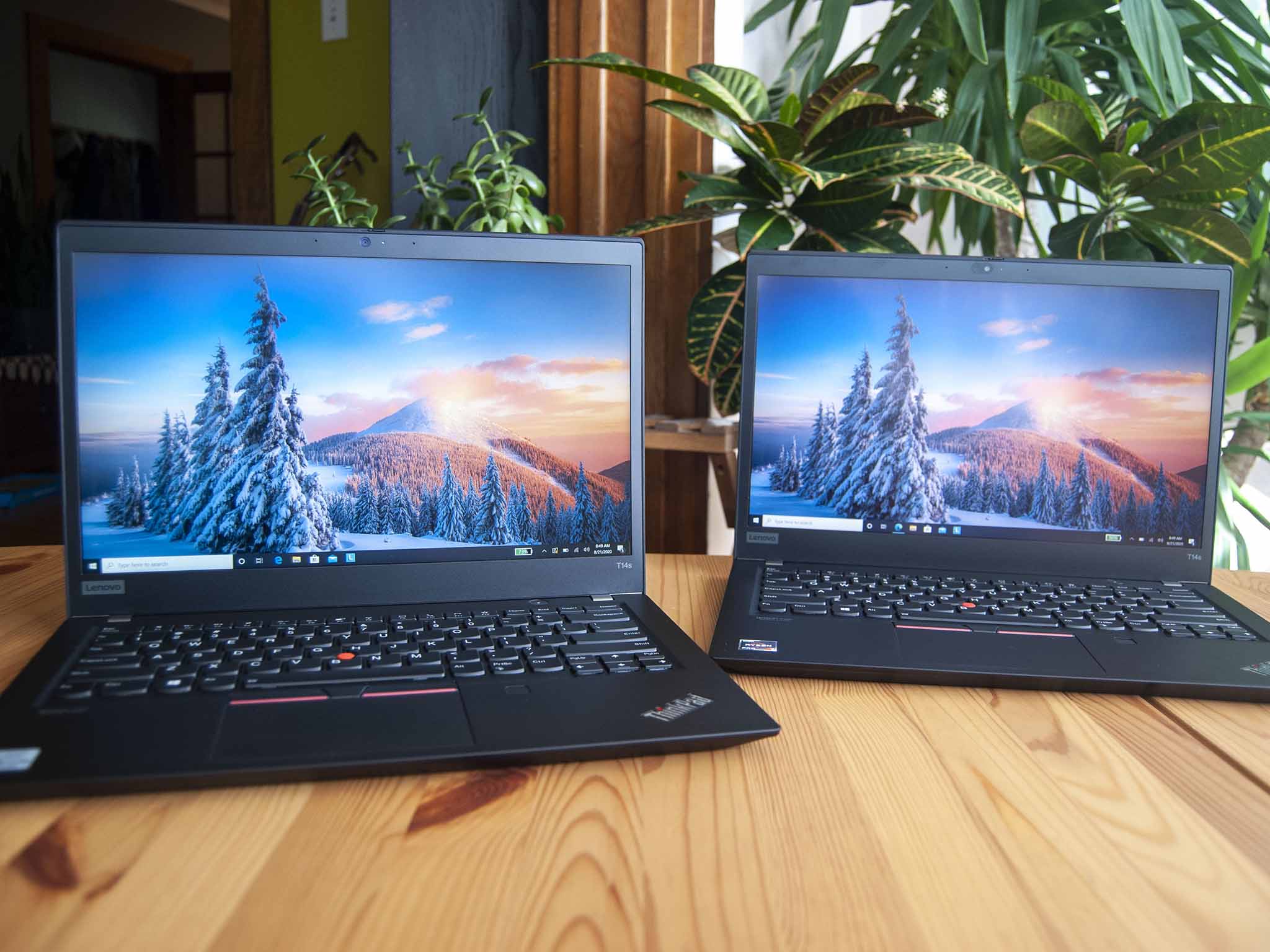
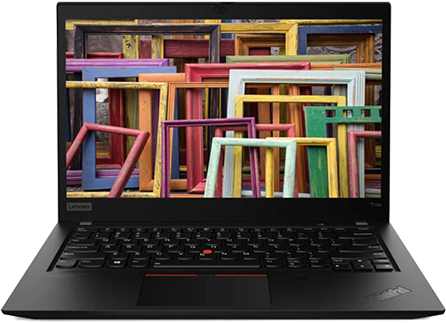
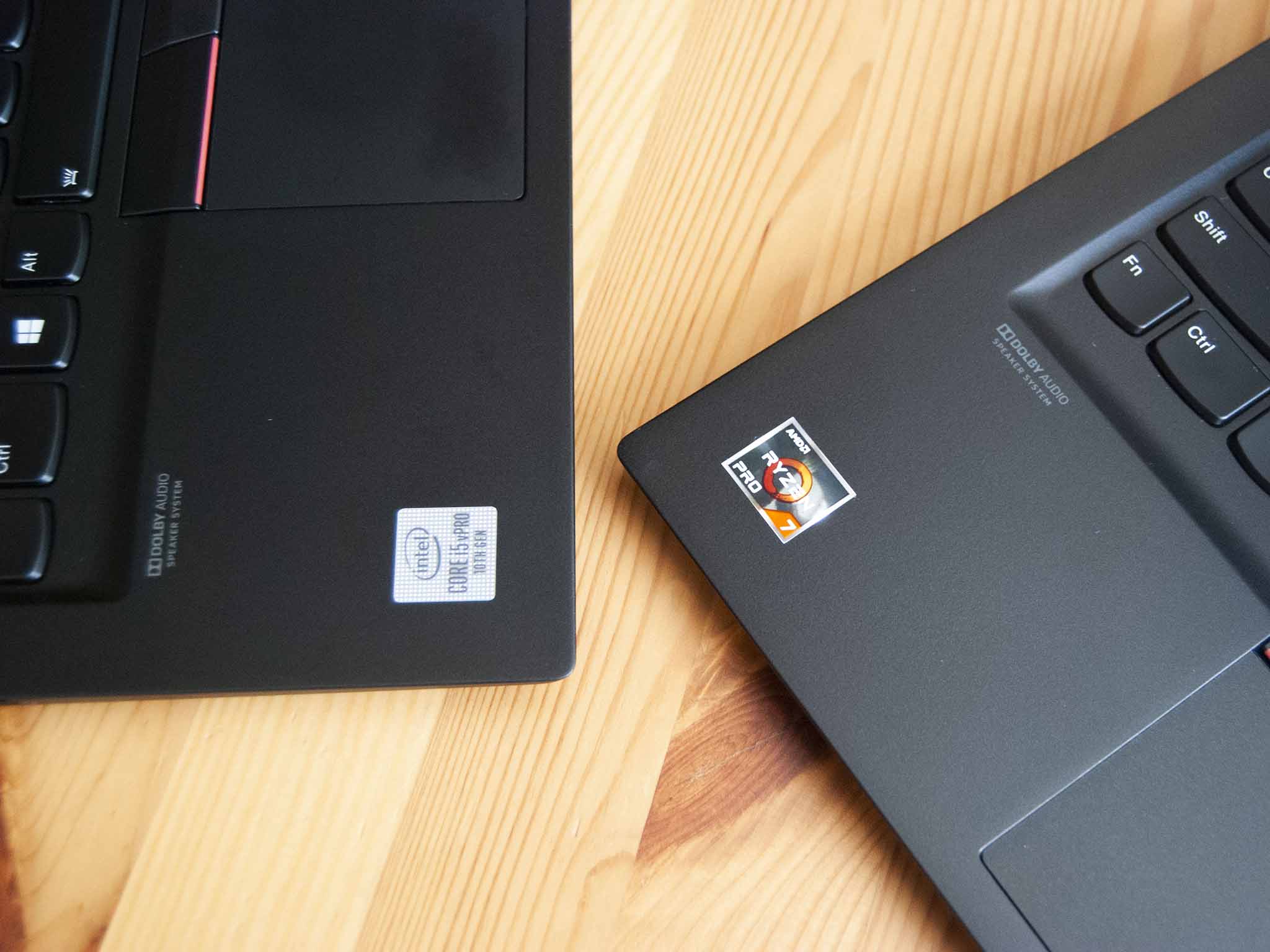
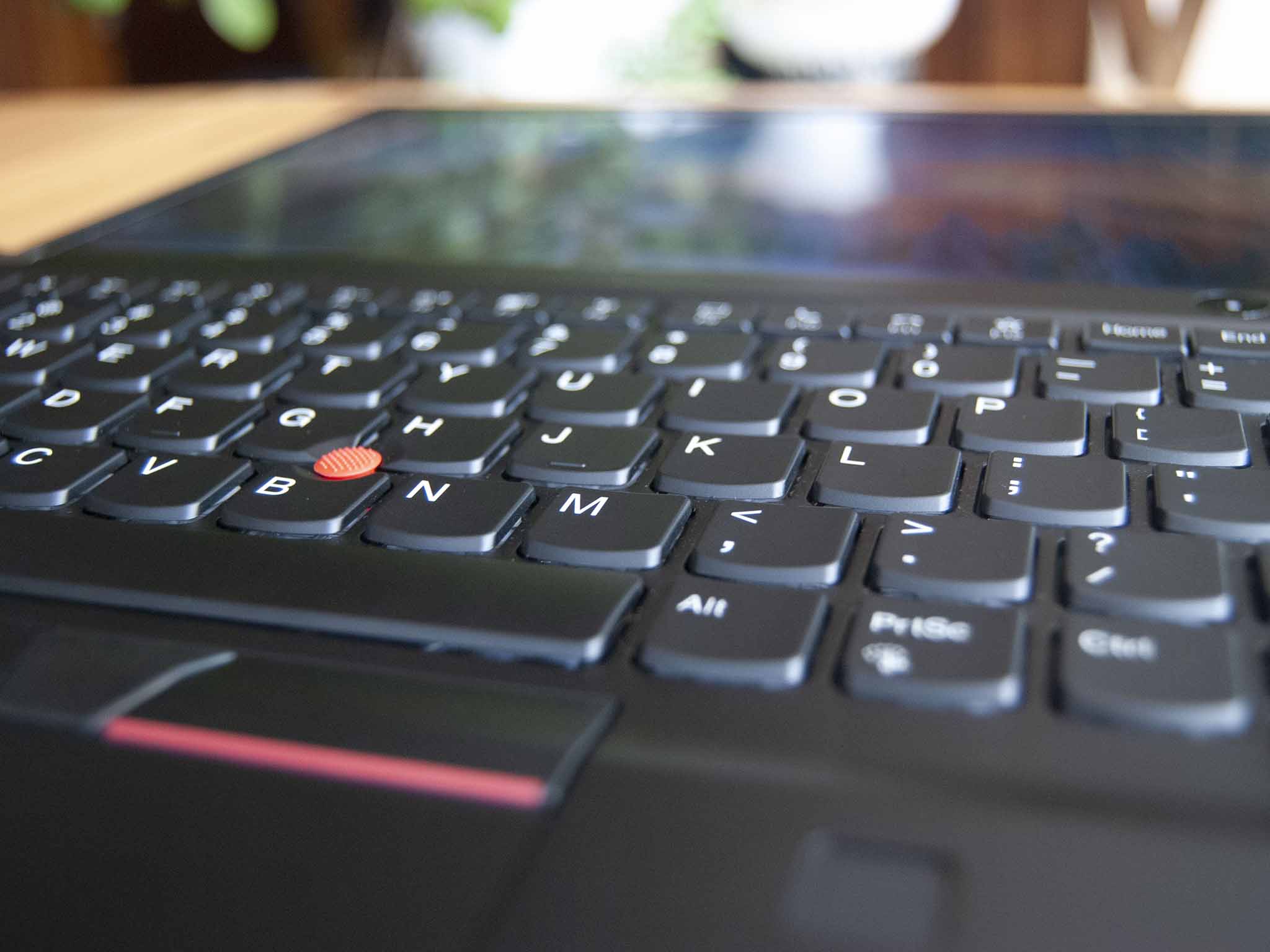
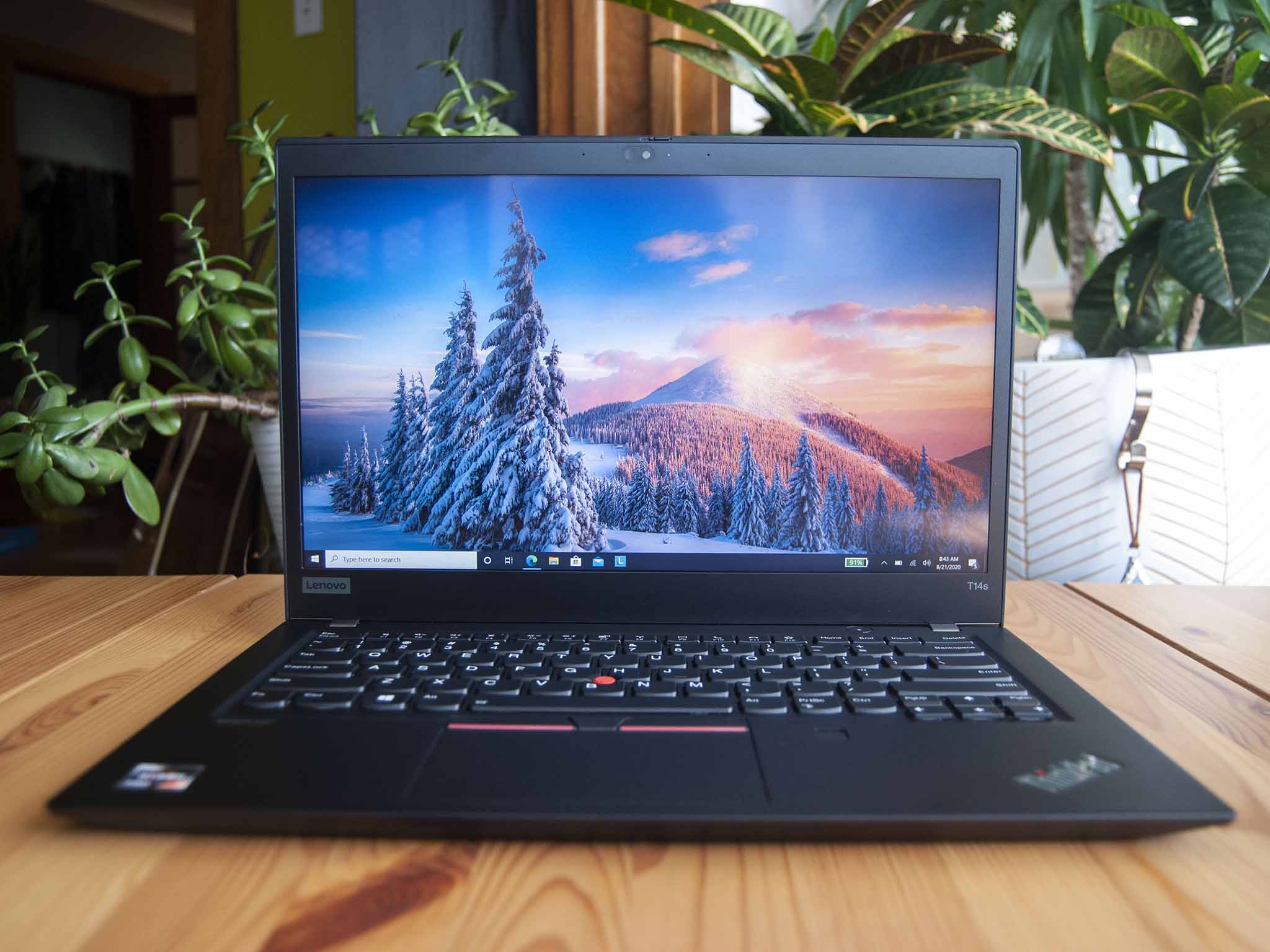
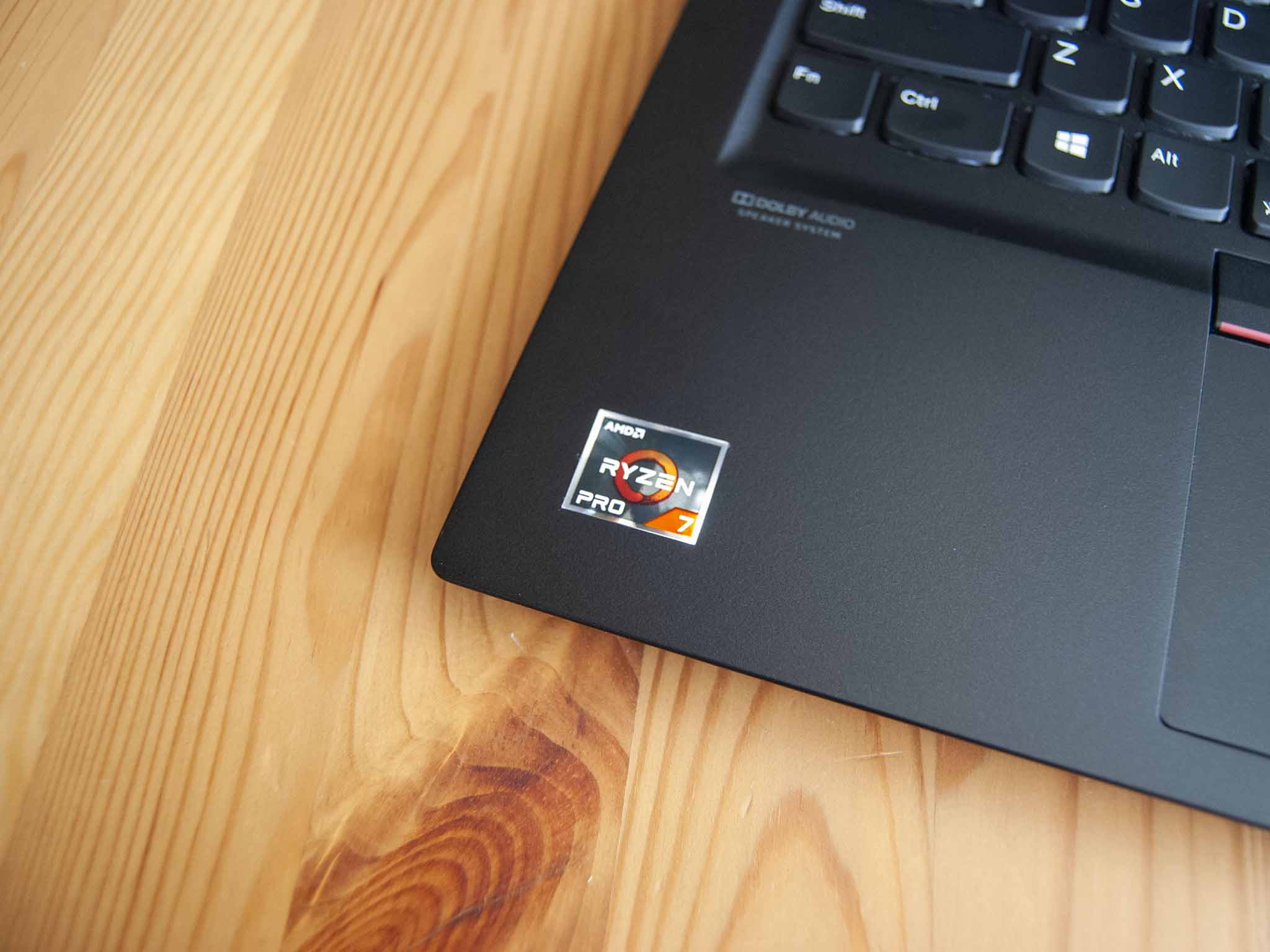
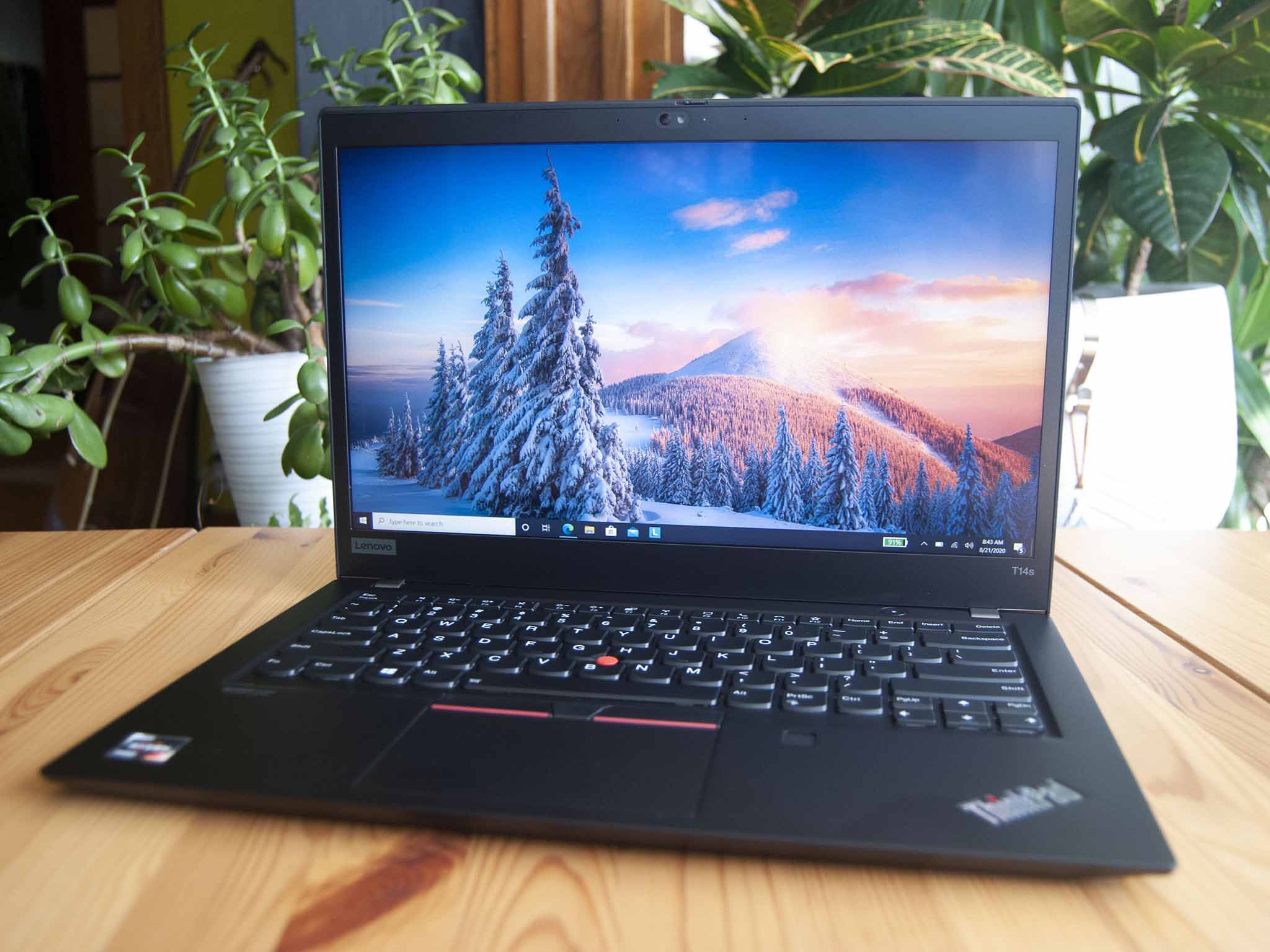
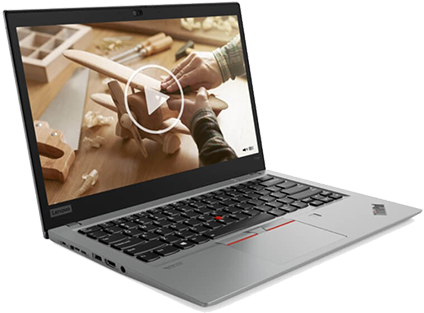




0 comments:
Post a Comment